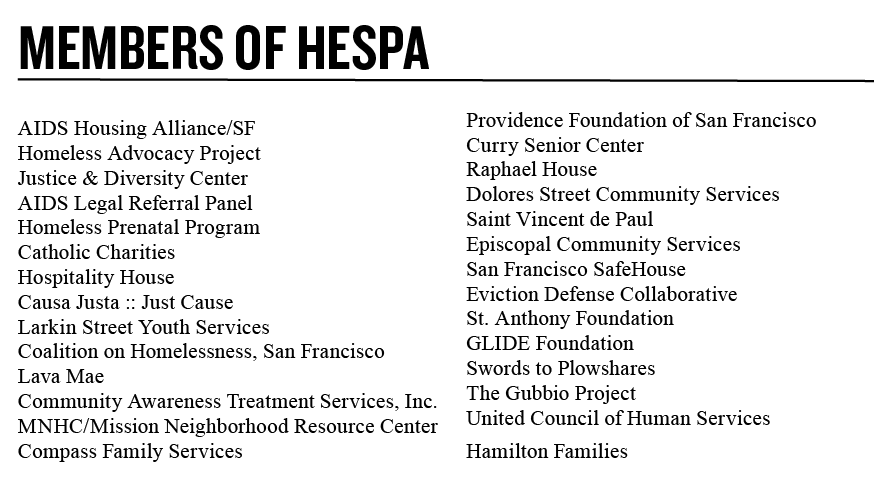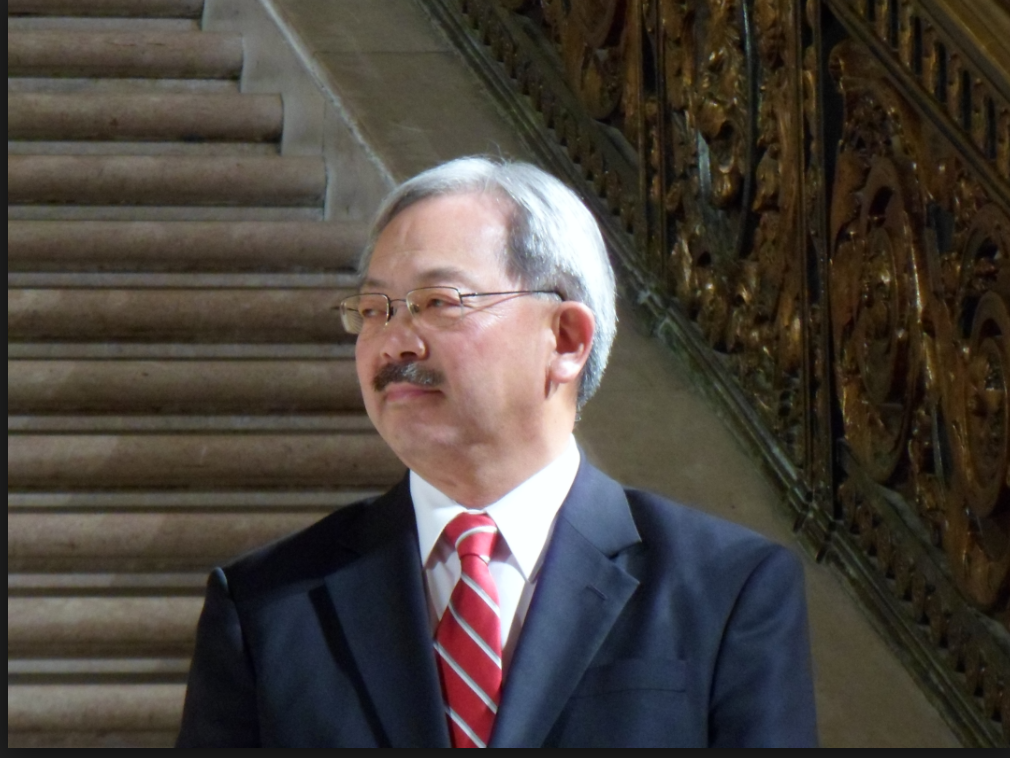During the City’s budget process, service providers fight hard for funding to keep San Franciscans housed and to house San Franciscans.
As the City’s budget process draws near, San Francisco’s homeless service providers and advocates have come together to call on the City to increase funding for housing and services for homeless populations. The Homeless Emergency Service Providers Association, or HESPA, is a group of 27 nonprofits that includes some of the biggest players in providing homeless services, including Compass Family Services, Larkin Street Youth Services, and Lava Mae.
While San Francisco residents’ top concern this year is homelessness according to an annual poll by the Chamber of Commerce, the City allocates little more than 2.7 percent of its almost $10 billion budget to homelessness. Despite the Mayor’s big talk about housing homeless people and providing supportive services, his fiscal track record speaks volumes: Despite the crisis, homelessness is a low priority.
Imminent cuts to the Department of Housing and Urban Development, headed by Secretary Ben Carson, indicate more clearly than ever that San Francisco cannot wait for the federal government to address homelessness. With almost 7,000 homeless people counted in San Francisco’s bi-annual homeless count and just over 1,300 shelter beds, shelter waiting lists have hit all-time highs for both families and single adults. At the same time, revenue measures that advocates hoped would pass in the November election—namely K (A sales tax revenue which would have provided an annual $50 million in homeless services) and S (which would have provided an additional $17 million towards housing for homeless families and arts)—failed at the ballot.
HESPA is no stranger to budget proposals: Since 2012, they have presented the City with budget proposals and work with city officials throughout the year on homeless and housing programs and policies.
This year, HESPA’s budget proposal asks the city to fund $9.52 million for the Fiscal Years 2017-2018 and $14.7 million for 2018-2019. The proposal attempts to both prevent homelessness and create exist out of homelessness, while ensuring an adequate emergency services system for those forced to remain on the streets.

The Ask
1. Prevent or end homelessness for 500 households
Rents have risen rapidly for everyone, but incomes for the bottom 50 percent of San Franciscans are stagnant. On the supply side, there has been limited creation of housing units that are affordable to homeless people. Tenant-based subsidy programs are crucial to leveling the playing field.
Fund 500 new housing subsidies to be used to prevent homelessness for people at risk of losing their homes or to allow homeless San Franciscans to access housing that they couldn’t afford without a subsidy. This would allow San Franciscans to move out of homelessness or retain permanent, rent-controlled housing. In addition, it would ensure formerly homeless individuals stay housed in supportive housing by continuing funding for mediation processes between property managers and tenants.
2. Expand and improve homeless services in the Bayview neighborhood
Fund operating expenses for a full-service shelter and supportive services, such as case management, in the Bayview neighborhood at an organization run and led by African Americans. The Bayview has the second largest population of homeless people and the largest African American population in San Francisco, yet the only shelter in the neighborhood lacks 24-hour access, actual beds (residents sleep on mats on the floor), and adequate shower access.
Many homeless Bayview residents have severe and chronic health issues, including hypertension, diabetes, respiratory disorders, and mobility issues. There is also an overwhelming number of homeless seniors residing in the Bayview District, many with complex medical and mobility issues. A full-service shelter would be invaluable to these homeless populations.
3. Enhance supportive services provided to homeless shelter residents
San Francisco’s Navigation Centers–which are essentially low-barrier shelters—provide enhanced services for their homeless residents, including the provision of storage, permitting pets and partners in the Navigation Centers, and providing laundry, meals, and intensive case management. These services are needed in San Francisco’s traditional shelter system, too.
At the same time, traditional shelter residents have due process rights through a shelter grievance process: They are able afforded the opportunity to appeal when asked to leave a shelter. Shelter residents have access to an advocate, can request an internal hearing, and, if there is still a disagreement, can choose to go to arbitration in front of an independent volunteer arbitrator whose decision is binding. Navigation center residents should also have those same rights.
4. Ensure that no homeless families sleep on the streets or in substandard conditions
Families sleep in small spaces on mats on the floor. There are no showers, insufficient bathrooms, and small children in diapers have no access to baths. The facility is closed during most of the day, and most everyone shares a large room. Families must rise early, find a place to shower, often times across town at a women’s drop-in center, and then get their children from school. They show up night after night and must bring their belongings with them. We must strive to replace San Francisco’s current emergency family shelter, which lacks 24 hour access, showers, and actual beds with a full-service family shelter.
When emergency shelters are full, families are turned away with nowhere to go. They have been forced to sit out in parks all night with their children or sleep on the floors of police stations. While this happens infrequently, it should not happen at all. Instead, families who are turned away from emergency shelters should be provided with one-night stays at moderately-priced hotels.
New initiatives and expanded programs are needed to keep pace with the scope of the crisis. Funding for the proposal would halt the preventable displacement of low-income San Franciscans from rent-controlled housing and relieve the burden of our city’s shelters by both expanding shelter and providing housing subsidies to some of the city’s most vulnerable residents, while addressing racial disparities in homeless programs.
The Budget Process
On June 1, the Mayor will present his budget proposal for all City departments (with the exception for the Enterprise departments) for fiscal years 2017 to 2018 and 2018 to 2019. The Board of Supervisors Budget and Finance Committee, made up of Supervisors Cohen, Yee, Tang, Kim, and Sheehy, will then hold public hearings on the budget in June and make recommendations to modify the Mayor’s budget to the full Board.
Last year, HESPA succeeded in getting about $12 million of their budget proposal supported, mostly from the Mayor. However, it was contingent on a failed revenue measure, Proposition K, so that most of that funding disappeared. The Board Committee was also different from last year, and perhaps a bit more friendly. This year, it is chaired by Supervisor Cohen who has been unfriendly towards homeless people in the past, co-sponsoring anti-homeless initiatives like the tent ban, and the large vehicle parking ban, another vital form of shelter for homeless people, while working against the creation of a homeless shelter in the Bayview.
More recently, however, Cohen supported a Navigation Center in located in the Dogpatch, which is in her district: “It is a testament to the cooperation and optimistic pragmatism of the neighborhood and small business community here in Dogpatch that we could make this Navigation Center happen. While the City must continue to collaborate with residents across all districts to alleviate this crisis, District 10 should be proud of its leadership and problem solving.”
Many of the HESPA’s requests are central to her district as it is such such a severely underserved community. Other committee members, such as Supervisor Sheehy, have also had mixed messaging around homelessness, first stating a Navigation Center would be inappropriate in his district, but also stating his support for something for queer youth. Supervisor Yee also stated a Navigation Center in his district is problematic, but he has been supportive of other solutions. Supervisor Kim, who has the district with the largest homeless population, has been a champion of solutions to homelessness and likely the strongest push inside the committee for supporting HESPA’s budget request will fall on her shoulders.
During this time, the Board of Supervisors do not have the power to increase the total budget, but can reallocate funding they have cut from departments. Each Supervisor, both on and off the committee, will submit a list of priorities, and then they negotiate with each other to put a final list together. The Board of Supervisors should have at least $20 million to work with once they make reductions from the Mayor’s Office. Last year, there was $24 million, but the budget is a bit tighter this year. There are many competing priorities for this funding, with specific district asks and about $80 million in requests coming from the community.
The entire budget is heard and voted on by the full Board of Supervisors mid July. The Mayor then approves and signs the budget.
Call to Action
San Francisco’s ongoing housing crisis, Alan Berube of the Brookings Institute observed, has put its very identity as a city at risk. Can a city consider itself progressive or a “sanctuary city” if it does not make room for the poorest of its citizens? Low-income San Franciscans should not have to face the choice of leaving the city or living on its streets. It is within our power to change this reality, and we need to act swiftly. Join us in demanding budget justice for homeless families and children, seniors, youth, and adults!
Call or email and ask the Mayor and Budget Chair Malia Cohen and ask that they fund the full $9.52 million HESPA budget proposal to provide shelter, case management, and housing subsidies to address the needs of homeless San Franciscans.
Mayor Ed Lee at (415) 554-6141 or mayoredwinlee@sfgov.org
Supervisor Malia Cohen (415) 554-7670 or malia.cohen@sfgov.org
Thursday, June 6 at 11am Meet us at the Coalition on Homelessness at 468 Turk St. to do a Supervisor Walkaround, where we will be presenting our recommendations for the City Budget in response to the Mayor’s June 1 budget proposal.


